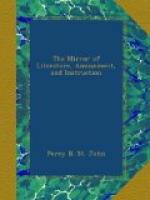Oxalic Acid.
The plant called sorrel is valued for its acidulous taste. This acidity is owing to the presence of a peculiar acid, which may be separated from the juice, and from the potash with which it is combined, by a process analagous to that described for the preparation of citric acid. It has obtained the name of oxalic acid, from the generic name of the plant, oxalis acetosella. This acid forms readily into regular crystals, of which one half the weight is water, the other half being pure acid. It is a remarkable circumstance in its constitution, that it contains no hydrogen, and that it consists merely of carbon and oxygen—there being twice as much oxygen as there is carbon. So that it differs from carbonic acid merely in the relative quantities of its ingredients. Oxalic acid can be prepared by an artificial process, with great ease, from sugar, and six times its weight of nitric acid,—the former affording the carbon necessary to its formation, and the latter the oxygen. It is only necessary to heat the nitric acid on the sugar; the sugar dissolves, and there is a violent effervescence, which must be moderated by immersion in cold water: when the mixture cools, crystals of oxalic acid form in abundance, which may be purified by a second crystallization.
Oxalic acid is an active poison; many persons have fallen victims to its virulence, by having swallowed it in mistake for Epsom salt, which it resembles in appearance. In all probability, this would not prove to be the only vegetable acid capable of acting as a poison. Chalk finely powdered, and diffused in water, is the proper antidote to the poison of oxalic acid.
[The chapter on Combustion
contains some new facts; and that
on the Atomic Theory is more
attractive than might have been
expected.]
* * * * *
THE GATHERER
* * * * *
The Plain Truth.—Sir John Trevor, cousin to Lord Chancellor Jefferies, was an able man, but as corrupt as he was able. He was twice Speaker of the House of Commons, and officially had the mortification to put the question to the house, “whether himself ought to be expelled for bribery.” The answer was “Yes.”
Freaks of Royalty.—James I. in a capricious mood, threatened the Lord Mayor with removing the seat of royalty, the meetings of parliament, &c. from the capital. “Your Majesty at least,” replied the Mayor, “will be graciously pleased to leave us the River Thames.”




